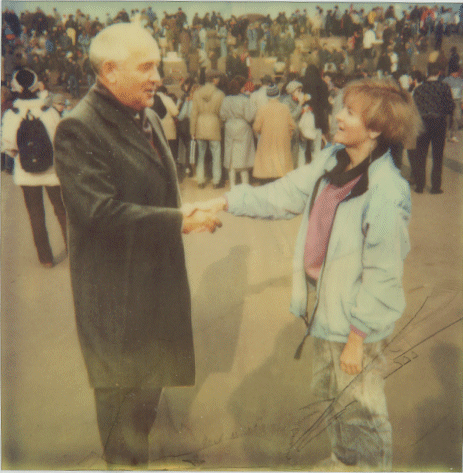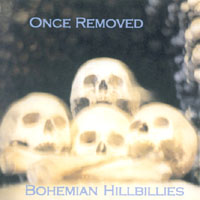Do you belong in the blogosphere?
(Welcome, readers of AIRSPACE, the quarterly journal for public radio producers. Today's post is actually part of the AIRSPACE Summer 2003 online E-dition, which includes many other interesting articles as well. Regular readers of The Dagley Dagley Daily may recall its original publication here on June 6.)

The real Mikhail Gorbachev was busy when I visited Moscow in 1990, but a cardboard stand-in greeted many lesser well-wishers such as myself.
By Janet Dagley Dagley
I’d like to begin this piece with a sound snippet: unfortunately I didn’t record it, so please indulge me in this reconstruction:
September, 1990, Moscow, USSR: “If you want to talk to Russians, go to Pushkin Square. You'll find a bunch of men on the street corner, all shouting at each other, talking politics, all day, all night. Get in there among them and start talking in English, loud. Anyone who can speak English will want to talk to you. They don't get to meet many English speakers," explained Eric, coordinator for our group, just arrived for a 6-week intensive Russian language course. Mikhail Gorbachev was still president then of what was still the Soviet Union, though glasnost and perestroika were well under way and communism had already fallen in Eastern Europe, all of which gave the shouting men ample conversation fodder.
And so we did just that, eight of us, in pairs spread out through the crowd, shouting at each other in English. Nobody seemed to notice, but we kept on, talking and talking about everything we could think of to talk about, still without drawing the slightest interest from any of the locals. Eventually my shouting partner and I got around to asking each other mundane questions such as, "So, what kind of movies do you like?", which at least revealed a mutual interest in the films of the Coen Brothers, and that led, in turn, to shouting our way through some of our favorite scenes from Raising Arizona, ("You want I should freeze or get down on the ground? Cause if'n I freeze, I can't rightly drop, and if'n I drop, I'm a-gonna be in motion"), but even that failed to draw the attention of a single one of those shouting Muscovites. We were disappointed, but understood that the locals had plenty to talk about amongst themselves: they kept on gathering and shouting until the racket they made changed their country and our world.
That's kind of what the blogosphere sounds like: a crowd of people all shouting at once, some at each other, few of them listening. Some of what they say is meaningful, some not, some original, some derivative, some of it other people's words, much of it pointed commentary, more of it pointless. The vast majority of voices here are shouting (whispering, muttering, confiding, babbling, droning) in English, with a noticeable minority blogging in Farsi (some of them getting hauled off by Iranian authorities as a result). Some of the English comes from non-native speakers, who blog in a foreign tongue so as to reach a wider audience, as Baghdad blogger Salam Pax did so notably during the invasion of Iraq. Some of the voices are saying something interesting, and saying it eloquently, while others seem to be going on and on about nothing.
Let's move on to another place, and another sound clip, which also will have to be heard only in your imagination because this one's not quite recordable:
June, 2003, New York, New York, USA: The raucous din of thousands of bloggers blogging is cited as one factor in the resignations of Executive Editor Howell Raines and Managing Editor Gerald Boyd from The New York Times. Many 2004 presidential candidates have blogs, as does at least one 2008 candidate. Everybody and their dog seems to have a blog.
So blogs are popular; ubiquitous, influential -- but what ARE they, exactly? "Blog" is short for "web log," and a web log is simply an online log or journal, with a series of posts usually in reverse chronological order. Blog posts are usually text, but can be graphics or audio if your blog host can handle larger files. Blogs usually include links, as this article does, which is why some people describe them as "guided tours of the Internet." Blogs are easy to set up and maintain, and there are numerous blog hosts and services out there, the best-known being Blogger (recently purchased by Google), Radio Userland, and Movable Type. You can put up a simple blog for free, or pay a little more for extra features and server space.
Blogging itself doesn't pay, per se -- not yet -- but some bloggers accept donations (blogger Andrew Sullivan reports in his "Blogger Manifesto" that he received $27,000 in donations the first year), either monetary (via PayPal) or in gifts (via wish lists set up at Amazon.com or elsewhere; here's mine). But a blog can be a great way to get the word out about your product, which is why more and more businesses are entering the blogosphere. The BBC set up a blog for its correspondents during the Iraq war, and some of the world's best-known newspapers also have blogs. One newspaper reporter started a blog, on his own time, but had to stop posting or lose his job at the Hartford Courant.
For me, blogging seemed like the perfect way to concentrate on my own writing once more after two years as AIRSPACE editor, and even more years editing other people's work. Perhaps foolishly, perhaps not, I set myself up with a daily deadline simply by naming my blog The Dagley Dagley Daily. I set up the site in about 10 minutes on Feb. 1, but didn't actually go daily until Feb. 16. Days after that, WYSO expressed interest in an audio version of a post I'd written about a local hero there in Dayton, Ohio, which I recorded, ripped to mp3, and e-mailed right away, then posted the mp3 on my blog later for those who didn't hear the broadcast. I haven't fully explored the audio aspect of the blog, though the "audioblogger" feature would allow me to literally phone in my posts if I wanted to go for that "distant correspondent" sound. But then, I've only begun to explore the blogosphere itself.
If you'd like to visit the blogosphere before deciding whether to establish your own outpost, try one of the constantly updated blog index sites such as DayPop, Blogdex, Weblogs.com or Blo.gs. Daypop will allow you to search or sort several ways through more than 45,000 blogs, including the most-linked-to blogs and top word bursts. Weblogs and Blo.gs both give you a chance to choose a random blog. Or use Google to search either the web or the news for words such as "blog", "blogger", "web log", or "blogosphere."
If you become a blogger yourself, remember that however personal your blog may seem, it's public. Anything you put on there is out there, where it can not only be seen, but copied and distributed, no matter what kind of copyright notice you may attach. If you don't mind having your blog content distributed elsewhere, you can still reserve some rights with a Creative Commons license. I chose to require attribution and allow noncommercial, but not commercial use.
By an interesting coincidence, on the very day that the Federal Communications Commission voted for media deregulation, which many predict will lead to a massive wave of media consolidation, I received an old-fashioned piece of paper by snail mail. On that paper: the ISSN (International Standard Serial Number) assigned by the Library of Congress for The Dagley Dagley Daily. I may be just one of many voices shouting on a street corner, but now my blog is officially a real periodical, an independently owned and operated, nonconsolidated media outlet.
posted by Janet Dagley Dagley @10:56 AM
|
10.7.03  |
|




